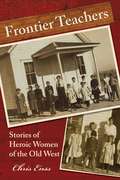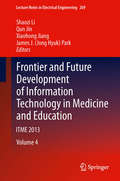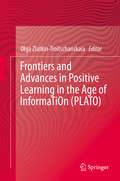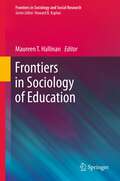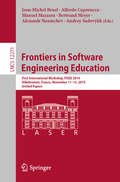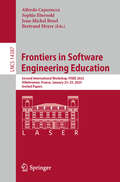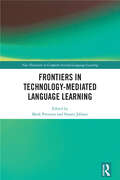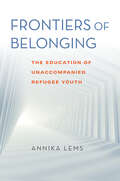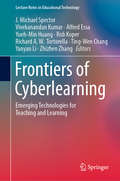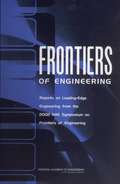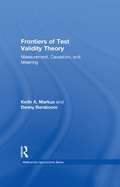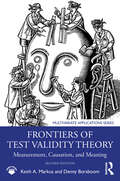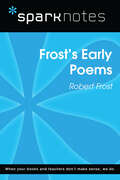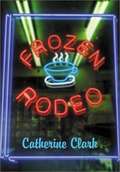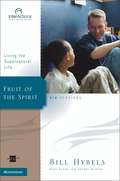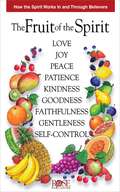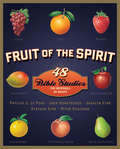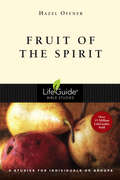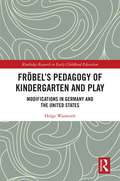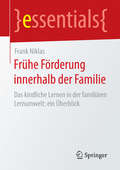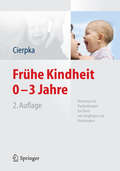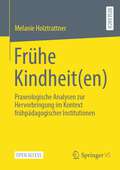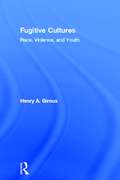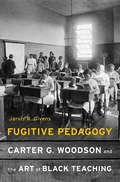- Table View
- List View
Frontier Teachers: Stories of Heroic Women of the Old West
by Chris EnssFrontier Teachers tells the stories of a dozen courageous, intrepid women who faced down rooms full of children on the open prairies and in the mining towns of the Old West to bring them educational opportunities.
Frontier and Future Development of Information Technology in Medicine and Education
by James J. Jong Hyuk Park Shaozi Li Qun Jin Xiaohong JiangIT changes everyday's life, especially in education and medicine. The goal of ITME 2013 is to further explore the theoretical and practical issues of IT in education and medicine. It also aims to foster new ideas and collaboration between researchers and practitioners.
Frontiers and Advances in Positive Learning in the Age of InformaTiOn (PLATO)
by Olga Zlatkin-TroitschanskaiaResearch on students’ media use outside of education is just slowly taking off. Influences of information and communication technologies (ICT) on human information processing are widely assumed and particularly effects of dis- and misinformation are a current threat to democracies. Today, higher education competes with a very diverse (online) media landscape and domain-specific content from sources of varying quality, ranging from high-quality videographed lectures by top-level university lecturers, popular-scientific video talks, collaborative wikis, anonymous forum comments or blog posts to YouTube remixes of discipline factoids and unverified twitter feeds. Self-organizing learners need more knowledge, skills, and awareness on how to critically evaluate quality and select trustworthy sources, how to process information, and what cognitive, affective, attitudinal, behavioral, and neurological effects it can have on them in the long term. The PLATO program takes on the ambitious goal of uniting strands of research from various disciplines to address these questions through fundamental analyses of human information processing when learning with the Internet. This innovative interdisciplinary approach includes elements of ICT innovations and risks, learning analytics and large-scale computational modelling aimed to provide us with a better understanding of how to effectively and autonomously acquire reliable knowledge in the Information Age, how to design ICTs, and shape social and human-machine interactions for successful learning. This volume will be of interest to researchers in the fields of educational sciences, educational measurement and applied branches of the involved disciplines, including linguistics, mathematics, media studies, sociology of knowledge, philosophy of mind, business, ethics, and educational technology.
Frontiers in Sociology of Education
by Maureen T. HallinanScholarly analysis in the sociology of education has burgeoned in recent decades. Frontiers in Sociology of Education aims to provide a roadmap for sociologists and other social scientists as they set bold new directions for future research on schools. In Part 1 of this forward-looking volume, the authors present cutting-edge research to set new guidelines for the sociological analysis of schools. In Part 2, notable social scientists, historians, administrators and educators provide a wide-ranging array of perspectives on contemporary education to insure that scholars make creative and broadly informed contributions to the sociological analysis of schools. The contributors to this volume examine events currently influencing education including: globalization, expansion of educational access, the changing significance of religion, new family structures, and curriculum reform. Frontiers in Sociology of Education offers an innovative collection of research and ideas aimed at inspiring new analyses of schools better linked to changing societal conditions.
Frontiers in Software Engineering Education: First International Workshop, FISEE 2019, Villebrumier, France, November 11–13, 2019, Invited Papers (Lecture Notes in Computer Science #12271)
by Bertrand Meyer Manuel Mazzara Jean-Michel Bruel Andrey Sadovykh Alfredo Capozucca Alexandr NaumchevThis book constitutes invited papers from the First International Workshop on Frontiers in Software Engineering Education, FISEE 2019, which took place during November 11-13, 2019, at the Château de Villebrumier, France. The 25 papers included in this volume were considerably enhanced after the conference and during two different peer-review phases. The contributions cover a wide range of problems in teaching software engineering and are organized in the following sections: Course experience; lessons learnt; curriculum and course design; competitions and workshops; empirical studies, tools and automation; globalization of education; and learning by doing. The final part "TOOLS Workshop: Artificial and Natural Tools (ANT)" contains submissions presented at a different, but related, workshop run at Innopolis University (Russia) in the context of the TOOLS 2019 conference. FISEE 2019 is part of a series of scientific events held at the new LASER center in Villebrumier near Montauban and Toulouse, France.
Frontiers in Software Engineering Education: Second International Workshop, FISEE 2023, Villebrumier, France, January 23–25, 2023, Invited Papers (Lecture Notes in Computer Science #14387)
by Bertrand Meyer Jean-Michel Bruel Alfredo Capozucca Sophie EbersoldThis book constitutes invited papers from the Second International Workshop on Frontiers in Software Engineering Education, FISEE 2023, which took place at the Château de Villebrumier, France, during January 23-25, 2023. The Editorial and the 8 papers included in this volume were considerably enhanced after the conference and during two different peer-review phases. The contributions cover the main topics of the workshop: education in technology and technology for education; new (and fearless) ideas on education; adjustments in teaching during pandemic: experience reports; models for class development; how to design learning objectives and outcomes; labs and practical sessions: how to conduct them; curriculum development; course design; quality course assessment; long-life studies in education; empirical research in SE education; experiences in starting-up new educational systems; blended education. FISEE 2023 is part of a series of scientific events held at the new LASER center in Villebrumier near Montauban and Toulouse, France.
Frontiers in Technology-Mediated Language Learning (New Directions in Computer Assisted Language Learning)
by Mark Peterson Nasser JabbariIn the context of continuing technological innovation, the field of technology-mediated foreign language learning is expanding rapidly. Advances in digital technologies are providing researchers with opportunities to investigate a range of exciting new areas of research. This edited volume is designed to showcase a selection of recent cutting-edge innovations. This publication incorporates chapters dealing with the use virtual reality, social networking, speech technologies and social semiotics. Also included are chapters that focus on the relevant review work that is vital for progress in the field. This publication provides an indispensable guide to a wide range of practitioners, including language educators, researchers, graduate students, learning scientists and instructional designers.
Frontiers of Belonging: The Education of Unaccompanied Refugee Youth (Worlds in Crisis: Refugees, Asylum, and Forced Migration)
by Annika LemsAs unprecedented numbers of unaccompanied African minors requested asylum in Europe in 2015, Annika Lems witnessed a peculiar dynamic: despite inclusionary language in official policy and broader society, these children faced a deluge of exclusionary practices in the classroom and beyond. Frontiers of Belonging traces the educational paths of refugee youth arriving in Switzerland amid the shifting sociopolitical terrain of the refugee crisis and the underlying hierarchies of deservingness. Lems reveals how these minors sought protection and support, especially in educational settings, but were instead treated as threats to the economic and cultural integrity of Switzerland. Each chapter highlights a specific child's story—Jamila, Meron, Samuel, and more—as they found themselves left out, while on paper being allowed "in." The result is a highly ambiguous social reality for young refugees, resulting in stressful, existential balancing acts. A captivating ethnography, Frontiers of Belonging allows readers into the Swiss classrooms where unspoken distinctions between self and other, guest and host, refugee and resident, were formed, policed, and challenged.
Frontiers of Cyberlearning: Emerging Technologies For Teaching And Learning (Lecture Notes In Educational Technology Ser.)
by J. Michael Spector Rob Koper Yanyan Li Yueh-Min Huang Ting-Wen Chang Vivekanandan Kumar Alfred Essa Zhizhen Zhang Richard A. TortorellaThis book demonstrates teachers’ and learners’ experiences with big data in education; education and cloud computing; and new technologies for teacher support. It also discusses the advantages of using these frontier technologies in teaching and learning and predicts the future challenges. As such, it enables readers to better understand how technologies can improve learning and teaching experiences. It is intended for graduates and scholars in educational technology disciplines and anyone interested in the applications of frontier technologies in education.
Frontiers of Engineering: Reports on Leading-edge Engineering from the 2002 NAE Symposium on Frontiers of Engineering
by National Academy of Engineering StaffThis collection includes summaries of presentations given at the NAE Symposium in September 2002. Topics include chemical and molecular engineering in the 21st century, human factors engineering, the future of nuclear energy, and engineering challenges for quantum information technology.
Frontiers of Test Validity Theory: Measurement, Causation, and Meaning (Multivariate Applications Series)
by Keith A. Markus Denny BorsboomThis book examines test validity in the behavioral, social, and educational sciences by exploring three fundamental problems: measurement, causation and meaning. Psychometric and philosophical perspectives receive attention along with unresolved issues. The authors explore how measurement is conceived from both the classical and modern perspectives. The importance of understanding the underlying concepts as well as the practical challenges of test construction and use receive emphasis throughout. The book summarizes the current state of the test validity theory field. Necessary background on test theory and statistics is presented as a conceptual overview where needed. Each chapter begins with an overview of key material reviewed in previous chapters, concludes with a list of suggested readings, and features boxes with examples that connect theory to practice. These examples reflect actual situations that occurred in psychology, education, and other disciplines in the US and around the globe, bringing theory to life. Critical thinking questions related to the boxed material engage and challenge readers. A few examples include: What is the difference between intelligence and IQ? Can people disagree on issues of value but agree on issues of test validity? Is it possible to ask the same question in two different languages? The first part of the book contrasts theories of measurement as applied to the validity of behavioral science measures.The next part considers causal theories of measurement in relation to alternatives such as behavior domain sampling, and then unpacks the causal approach in terms of alternative theories of causation.The final section explores the meaning and interpretation of test scores as it applies to test validity. Each set of chapters opens with a review of the key theories and literature and concludes with a review of related open questions in test validity theory. Researchers, practitioners and policy makers interested in test validity or developing tests appreciate the book's cutting edge review of test validity. The book also serves as a supplement in graduate or advanced undergraduate courses on test validity, psychometrics, testing or measurement taught in psychology, education, sociology, social work, political science, business, criminal justice and other fields. The book does not assume a background in measurement.
Frontiers of Test Validity Theory: Measurement, Causation, and Meaning (Multivariate Applications Series)
by Keith A. Markus Denny BorsboomNow in its second edition, this important book examines test validity in the behavioral, social, and educational sciences by exploring three fundamental problems: measurement, causation, and meaning. Psychometric and philosophical perspectives and unresolved issues receive attention, as the authors explore how measurement is conceived from both the classical and modern perspectives.Split into three accessible sections, the first contrasts theories of measurement as applied to the validity of behavioral science measures, and the second considers causal theories of measurement as well as alternative theories of causation. The final section explores the meaning and interpretation of test scores as they apply to test validity, offering a conceptual overview of the field and its current state. Each carefully revised chapter begins with an overview of key theories and literature, concludes with a list of suggested readings, and features boxes with real-life situations that connect theory to practice. Examples of specific issues include: How tests can assess an attribute without measuring it. The role of values in test validity. Interpreting responses to the same question in different languages. Researchers, practitioners, and policy makers interested in test validity or developing tests will appreciate the book's cutting-edge review of test validity. Focusing on both the underlying concepts, as well as practical challenges of test construction and use, it also serves as a supplement in graduate or advanced undergraduate courses on test validity, psychometrics, testing, or measurement taught in psychology, education, sociology, social work, political science, business, criminal justice, and other fields. The book does not assume a background in measurement.
Frost's Early Poems (SparkNotes Literature Guide Series)
by SparkNotesFrost's Early Poems (SparkNotes Literature Guide) by Robert Frost Making the reading experience fun! Created by Harvard students for students everywhere, SparkNotes is a new breed of study guide: smarter, better, faster.Geared to what today's students need to know, SparkNotes provides:chapter-by-chapter analysis explanations of key themes, motifs, and symbols a review quiz and essay topics Lively and accessible, these guides are perfect for late-night studying and writing papers.
Frozen Rodeo
by Catherine ClarkSummer is supposed to be fun. Right? Peggy Fleming Farrell's summer has taken a turn for the worse: She works at the Gas 'n Git to pay back her parents for wrecking two cars, takes summer school French from a succession of increasingly lame substitute teachers, loves an IHOP waiter, and attends Lamaze class with her mother while her father prepares for his professional ice-skating comeback (read: midlife crisis). Just when the only exciting event looming before her is the town's annual Rodeo Roundup Days -- "exciting" being a relative term -- things take an unexpected turn for the better. Between hijinks with a hijacked golf cart, plans for streaking at the Rodeo parade, and a showdown over pancakes, Peggy's summer becomes more about mayhem than money management, and definitely something close to fun. Even if she never learns to speak French.
Fruit of the Spirit
by Bill Hybels Kevin HarneyIt takes the power of God to produce the character of God. Putting others’ needs ahead of our own: it’s the ultimate expression of love—and the hardest. Fortunately, we don’t have to go it alone. In Fruit of the Spirit, you’ll learn about the life-transforming qualities God wants to cultivate inside you. And you’ll discover the supernatural Agent who empowers you to attain them: the Holy Spirit, working within you to produce each kind of spiritual “fruit.” In the Holy Spirit’s power, you can live a supernatural life that transforms every relationship you have. And in the process, you’ll discover the one route to a truly satisfying life: serving others. Interactions—a powerful and challenging tool for building deep relationships between you and your group members, and you and God. Interactions is far more than another group Bible study. It's a cutting-edge series designed to help small group participants develop into fully devoted followers of Christ.
Fruit of the Spirit
by Rose PublishingThe Fruit of the Spirit - How the Spirit Works In and Through BelieversHow does the Holy Spirit work in the lives of Christians? The answers are found in this bestselling ebook, The Fruit of the Spirit. Based on Galatians 5: 22 & 23, this informative ebook helps Christians understand nine fruit of the Spirit: love, joy, peace, patience, kindness, goodness, faithfulness, gentleness, and self-control. These traits can only be developed with the help of the Holy Spirit. The Fruit of the Spirit is an excellent tool for teaching, for devotions, or for reference. Scripture in both the Old and New Testaments refers to bearing fruit. For believers today, the fruit of the Spirit represents the outward or visible growth believers experience in Christ through the Holy Spirit. That's why this teaching is so important. The Fruit of the Spirit ebook is an excellent tool for teaching students of all ages how the Spirit works in and through believers to achieve true change in behaviors and actions. It also makes an outstanding devotional or reference guide. "But the fruit of the Spirit is love, joy, peace, patience, kindness, goodness, faithfulness, gentleness and self-control. Against such things there is no law." Galatians 5:22, 23 The Fruit of the Spirit is an excellent study for believers at any level of spiritual growth or maturity. Believers will spend a lifetime seeking the manifestation of the fruits in their lives. The Fruit of the Spirit ebook provides insight to how the fruit of the Spirit was evident in the life of Jesus as well as what the fruit truly looks like in the lives of believers. Here is an example - One of the fruits of the Spirit is love. The Fruit of the Spirit defines love as: Love is not based on emotions or feelings. It is a decision to be committed to the well being of others without any conditions or circumstances.The Fruit of the Spirit reveals:•A definition for each fruit of the Spirit•How each fruit was exemplified in Jesus' life•Scripture references that show the fruit manifested in someone's life•The Greek Word for each of the fruits of the Spirit, including these two•The Greek word for love is agape•The Greek word for joy is chara The Fruit of the Spirit ebook offers four powerful verses that define Good Fruit as well as a list of Bad Fruit that includes greed, anger, drunkenness, and evil desires, among others. The Fruit of the Spirit ebook makes a great supplemental resource for these bestselling authors' titles:•Beth Moore, Living Beyond Yourself: Exploring the Fruit Of The Spirit•Bill Hybels, Fruit of the Spirit•Stuart Briscoe, The Fruit of the Spirit: Cultivating Christlike Character.Topical index: agathosune, agape, anger, bearing fruit, chara, chrestotes, debauchery, deceit, drunkenness, egkratea, eirene, envy, evil desires, factions, faith, fatithfulness, filthy language, fits of rage, fruit, gentleness, goodness, greed, hatred, idolatry, impurity, kindness, love, lust, jealousy, joy, orgies, makrothumia, malice, patience, peace, pistis, prautes, self-control, selfish ambition, sexual immorality, slander, spiritual fruit, witchcraft, nine fruits of the spirit.
Fruit of the Spirit: 48 Bible Studies for Individuals or Groups
by Peter Scazzero Jacalyn Eyre Jack Kuhatschek Phyllis J. Lepeau Stephen EyreThese forty-eight Bible studies were written with one goal in mind – to allow the Spirit of God to use the Word of God to produce fruit in your life. These studies will help you discover what the Bible says rather than simply telling you what it says. They encourage you to think and to explore rather than to merely fill in blanks. Fruit of the Spirit will help you discern what the Bible says about the vital traits that the Holy Spirit produces in believers, and move you beyond reflection to application. Designed for use as personal Bible study or group study, the interactive format will help you grow in your ability to reflect the character of Jesus and will aid not only in understanding the fruit, but also in applying them to daily life.
Fruit of the Spirit: Devenir Semblable A Christ: 9 Etudes Pour Individus Ou Groupes (LifeGuide® Bible Studies)
by Hazel OffnerLove, joy, peace, patience, kindness, goodness, faithfulness, gentleness, self-control. To be spiritually mature is to show the fruit of the Spirit of Christ in our lives. These Bible studies from Old and New Testament passages highlight each quality and inspire us to nurture the Spirit's fruit in our lives.
Fröbel’s Pedagogy of Kindergarten and Play: Modifications in Germany and the United States (Routledge Research in Early Childhood Education)
by Helge WasmuthThis text provides a comprehensive analysis of historical archives, letters, and primary sources to offer unique insight into how Fröbel’s pedagogy of kindergarten and play has been understood, interpreted, and modified throughout history and in particular, as a consequence of it’s adoption in the US. Tracing the development, modification, and global spread of the kindergarten movement, this volume demonstrates the far-reaching impacts of Fröbel’s work, and asks how far contemporary understandings of the kindergarten pedagogy reflect the educationalist’s original intentions. Recognizing that Fröbel’s pedagogy has at times been simplified or misunderstood, the book tackles issues caused by translation, or transfer to non-German speaking countries such as the US, and so demonstrates how and why contemporary research and Froebelian practice is in the danger of diverging from the original ideas expressed in Fröbel’s work. By returning to original documents produced by Fröbel, Wasmuth traces various interpretations, and explains how and why some of these understandings established themselves in the context of US Early Childhood Education, whilst others did not. This insightful text will be of great interest to graduate and postgraduate students, researchers, academics, professionals and policy makers in the fields of early childhood education, history of education, Philosophy of Education and Teacher Education.
Frühe Förderung innerhalb der Familie: Das kindliche Lernen in der familiären Lernumwelt: ein Überblick (essentials)
by Frank NiklasFrank Niklas setzt sich in diesem essential mit dem spannenden Themenfeld der familiären Lernumwelt auseinander. Der Autor fasst alles Wichtige zur Förderung früher mathematischer und schriftsprachlicher Kompetenzen innerhalb der Familie einfach und kompakt zusammen. So zeigt er, dass Würfelspiele und Vorlesen bereits ein guter Start, aber bei Weitem noch nicht alles sind. Eine anregungsreiche und positive familiäre Lernumwelt für die eigenen Kinder zu gestalten, gelingt nicht einfach so nebenbei. Aber es ist auch nicht allzu schwierig, die eigenen Kinder zu unterstützen – und viel wichtiger: Es kann richtig Spaß machen.
Frühe Kindheit 0-3 Jahre
by Manfred CierpkaDas umfassende Handbuch zur Beratung und Psychotherapie: 0-3 Jahre Dieses Buch versammelt die renommierten deutschsprachigen Experten auf dem Gebiet. Durch die Ausweitung auf Kleinkinder wird der Bereich der frühen Kindheit von 0 bis 3 Jahren abgedeckt. Das Buch stellt nicht nur Beratungskonzepte dar, sondern auch darüber hinausgehende vertiefende psychotherapeutische Behandlungskonzepte. Im Handbuch werden auch die Grundlagen ausführlich dargestellt, sowohl was die körperliche und seelische Entwicklung des Kindes angeht, als auch korrespondierende Veränderungen und Belastungen in Partnerschaft und Familie. Im zentralen Teil des Buches werden die Probleme und Störungsbilder bei den 0-3-jährigen Säuglingen und Kleinkindern und die Interventionen dargestellt. Die unterschiedlichen Belastungen von Familien werden im Hinblick auf das Behandlungskonzept gesondert aufgegriffen. Zum Schluss werden auch präventive Konzepte dargestellt, die im immer wichtiger werdenden Bereich der sogenannten "Frühen Hilfen" im deutschsprachigen Raum eine große Rolle spielen. Geschrieben für Kinder- und Erwachsenen-Psychotherapeuten, Psychiater, Kinderärzte, Sozialpädagogen (z. B. in der Jugendhilfe), Psychologen (z. B. an Beratungsstellen), Hebammen, Familienhelfer, Studierende. Das Praxisbuch, das jede Fachfrau, jeder Fachmann zur Hand haben sollte, wenn es um die Unterstützung von Säuglingen und Kleinkindern sowie deren Familie geht
Frühe Kindheit 0-3 Jahre: Beratung und Psychotherapie für Eltern mit Säuglingen und Kleinkindern
by Manfred CierpkaDas umfassende Handbuch zur Beratung und Psychotherapie: 0-3 Jahre: Dieses Buch versammelt die renommierten deutschsprachigen Experten auf dem Gebiet. Durch die Ausweitung auf Kleinkinder wird der Bereich der frühen Kindheit von 0 bis 3 Jahren abgedeckt. Das Buch stellt nicht nur Beratungskonzepte dar, sondern auch darüber hinausgehende vertiefende psychotherapeutische Behandlungskonzepte.- Im Handbuch werden auch die Grundlagen ausführlich dargestellt, sowohl was die körperliche und seelische Entwicklung des Kindes angeht, als auch korrespondierende Veränderungen und Belastungen in Partnerschaft und Familie.- Im zentralen Teil des Buches werden die Probleme und Störungsbilder bei den 0-3-jährigen Säuglingen und Kleinkindern und die Interventionen dargestellt.- Die unterschiedlichen Belastungen von Familien werden im Hinblick auf das Behandlungskonzept gesondert aufgegriffen.- Zum Schluss werden auch präventive Konzepte dargestellt, die im immer wichtiger werdenden Bereich der sogenannten „Frühen Hilfen“ im deutschsprachigen Raum eine große Rolle spielen.Geschrieben für Kinder- und Erwachsenen-Psychotherapeuten, Psychiater, Kinderärzte, Sozialpädagogen (z. B. in der Jugendhilfe), Psychologen (z. B. an Beratungsstellen), Hebammen, Familienhelfer, Studierende.Das Praxisbuch, das jede Fachfrau, jeder Fachmann zur Hand haben sollte, wenn es um die Unterstützung von Säuglingen und Kleinkindern sowie deren Familie geht.
Frühe Kindheit(en): Praxeologische Analysen zur Hervorbringung im Kontext frühpädagogischer Institutionen
by Melanie HolztrattnerIn diesem Open-Access-Buch nähert sich Melanie Holztrattner aus einer praxeologischen Perspektive der Frage, wie frühe Kindheit in frühpädagogischen Institutionen hervorgebracht wird. Aktuelle Diskurse der childhood studies aufgreifend wird Kindheit als in generationaler Ordnung (re)produziertes, historisch-kulturell gerahmtes und zugleich normativ-realitätsmächtiges Konstrukt verhandelt. Um sich der Frage nach der Hervorbringung früher Kindheit empirisch zu nähern, wurden ethnografische Feldaufenthalte in frühpädagogischen Institutionen in Österreich durchgeführt, wobei insbesondere die teilnehmenden Beobachtungen einen Zugang zu den Praktiken der Akteur*innen gewährten. Ausgewählte Feldprotokolle wurden mittels Dokumentarischer Methode rekonstruktiv analysiert. Die generierte relationale agency-Typologie bietet ein Deutungsangebot, frühe Kindheit als eine von Kindern und Fachkräften gemeinschaftlich hervorgebrachte Leistung vor dem Hintergrund komplexer Ordnungen zu verstehen. IndemHandlungs-, Entscheidungs- und Deutungsmacht in den Praktiken der Akteur*innen auf unterschiedliche Weise zu- oder abgesprochen und dabei Anerkennung auf unterschiedliche Weise (un)erlebbar wird, erfährt auch (kindliche) agency unterschiedliche Möglichkeiten der Beförderung und Begrenzung. Frühe Kindheit kann vor diesem Hintergrund auf plurale Weise in frühpädagogischen Institutionen hervorgebracht werden.
Fugitive Cultures: Race, Violence, and Youth
by Henry A. GirouxFugitive Cultures examines how youth are being increasingly subjected to racial stereotyping and violence in various realms of popular culture, especially children's culture. But rather than dismissing popular culture, Henry Giroux addresses its political and pedagogical value as a site of critique and learning and calls for a reinvigorated critical relationship between cultural studies and those diverse cultural workers committed to expanding the possibilities and practices of democratic public life.
Fugitive Pedagogy: Carter G. Woodson and the Art of Black Teaching
by Jarvis R. GivensA fresh portrayal of one of the architects of the African American intellectual tradition, whose faith in the subversive power of education will inspire teachers and learners today. Black education was a subversive act from its inception. African Americans pursued education through clandestine means, often in defiance of law and custom, even under threat of violence. They developed what Jarvis Givens calls a tradition of “fugitive pedagogy”—a theory and practice of Black education in America. The enslaved learned to read in spite of widespread prohibitions; newly emancipated people braved the dangers of integrating all-White schools and the hardships of building Black schools. Teachers developed covert instructional strategies, creative responses to the persistence of White opposition. From slavery through the Jim Crow era, Black people passed down this educational heritage. There is perhaps no better exemplar of this heritage than Carter G. Woodson—groundbreaking historian, founder of Black History Month, and legendary educator under Jim Crow. Givens shows that Woodson succeeded because of the world of Black teachers to which he belonged: Woodson’s first teachers were his formerly enslaved uncles; he himself taught for nearly thirty years; and he spent his life partnering with educators to transform the lives of Black students. Fugitive Pedagogy chronicles Woodson’s efforts to fight against the “mis-education of the Negro” by helping teachers and students to see themselves and their mission as set apart from an anti-Black world. Teachers, students, families, and communities worked together, using Woodson’s materials and methods as they fought for power in schools and continued the work of fugitive pedagogy. Forged in slavery, embodied by Woodson, this tradition of escape remains essential for teachers and students today.
